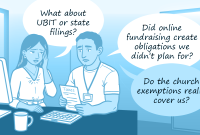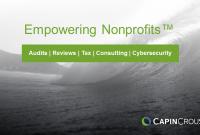Tax and Finance

Learn the key tax and charitable solicitation filing requirements for nonprofits, including IRS Form 990 obligations and state registration rules for fundraising compliance.

A high-level overview of key year-end tax considerations for businesses, covering entity type, income and expenses, payroll compliance, and common risk areas as owners prepare for tax filings.

This article discusses which organizations and activities can qualify for tax exemption and what to consider before starting a nonprofit. Next, it covers selecting your organization’s initial directors and officers and drawing up your organization’s governance documents. Third, it examines the different categories of nonprofit organizations that the IRS recognizes as tax-exempt under Section 501(c)(3). Fourth, it looks at restrictions on private inurement and political activities and how to avoid getting into trouble with the IRS on those issues. Finally, it examines the process of applying for 501(c)(3) status and how to maintain that status going forward.

Thinking about selling your business? Dive into this insightful guest post by Anders Bengtson of American Business Advisors. Explore key steps and essential advice for a smooth business transition.

Since remote worker expense reimbursements are currently being challenged in several lawsuits, here are points that other employers should know.

Why companies like Google have scaled back their free meal programs for employees working remotely, and why the tax issues involved matter for other businesses too.

There are many ways fraud can be committed at a nonprofit organization. The one thing all types of fraud have in common, however, is that they involve a violation of trust. And nowhere is the damage from that violation more acute than in not-for-profit organizations, which by their very nature and purpose are part of the public trust. Learn more about how to prevent fraud in a guest post and questionnaire by CapinCrouse!

Employer-provided healthcare may be canceled during FMLA leave in some situations. What conditions must be met to terminate health coverage while an employee is on leave? And should an employer do it?
In this guest article by Dusty Rhodes, he examines projections about future support for nonprofits in 2018 and beyond. Most experts are predicting less giving overall—the debate is primarily “how much less.”
